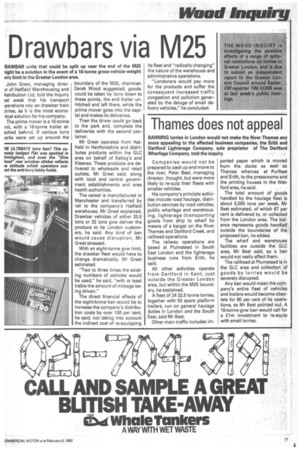Drawbars via M25
Page 11

If you've noticed an error in this article please click here to report it so we can fix it.
1RAWBAR units that could be light be a solution in the event wry limit in the Greater London
John Greet, managing direc3r of Hatfield Warehousing and listribution Ltd, told the Inquiry )st week that his transport ,perations rely on drawbar train mies, as it is the most econolicel solution for his company. The prime mover is a 16-tonne Init, with a 16-tonne trailer atached behind. If various lorry larks were set up around the
boundary of the M25, chairman Derek Wood suggested, goods could be taken by lorry down to these points, the end trailer unhitched and left there, while the prime mover goes into the capital and makes its deliveries.
Then the driver could go back to the park and, complete the deliveries with the second container.
Mr Greet operates from Hatfield in Hertfordshire and distributes products within the GLC area on behalf of Kellog's and Kleenex. These products are delivered to wholesale and retail outlets, Mr Greet said, along with local and central government establishments and area health authorities.
The cereal is manufactured in Manchester and transferred by rail to the company's Hatfield warehouse, Mr Greet explained. Drawbar vehicles of either 20.5 tons or 32 tons gvw deliver the produce to its London customers, he said. Any kind of ban would cause disruption, Mr Greet stressed.
With an eight-tonne gvw limit, the drawbar fleet would have to change dramatically, Mr Greet estimated.
"Two to three times the existing numbers of vehicles would be used," he said, "with at least treble the amount of mileage being driven."
The direct financial effects of the eight-tonne ban would be to increase the company's distribution costs by over 100 per cent, he said, not taking into account the indirect cost of re-equipping its fleet and "radically changing" the nature of the warehouse and administrative operations.
"Londoners would pay more for the products and suffer the consequent increased traffic congestion and pollution generated by the deluge of small delivery vehicles," he concluded.


































































